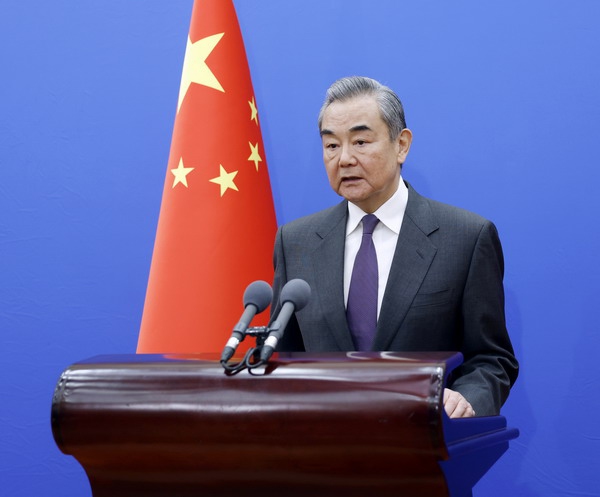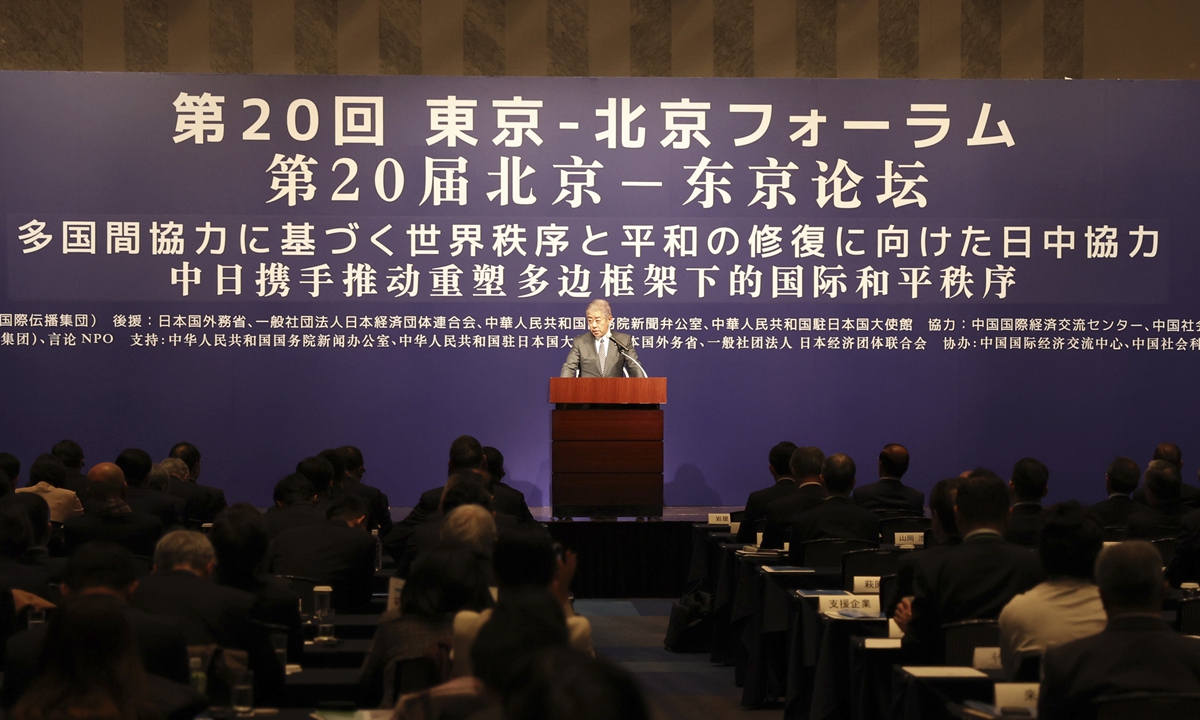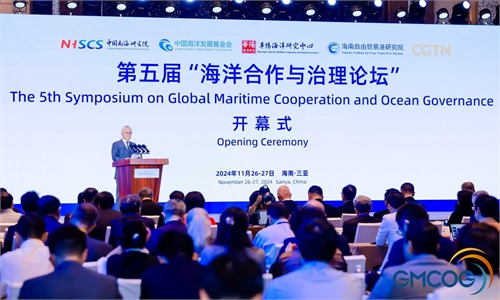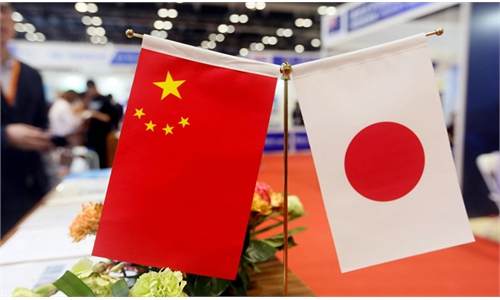Wang Yi addresses Beijing-Tokyo Forum via video, says sound ties positive for regional and global peace, devt
Forum hoped to enhance mutual understanding, explore ways to address differences: expert

Wang Yi photo:fmprc
The China-Japan relationship steering in the right direction benefits not only the two countries and their peoples but also contributes positively to regional and global peace and development, Chinese Foreign Minister Wang Yi remarked via video link at the 20th Beijing-Tokyo Forum that opened on Wednesday.Wang, also a member of the Political Bureau of the Communist Party of China Central Committee, continued to note that China has always regarded Japan as an important cooperative partner and hopes Japan views China's development objectively and rationally. Both sides should adhere to the correct positioning of "fully advancing a strategic and mutually beneficial relationship" and uphold the critical consensus of being cooperative partners who pose no threat to each other, according to a transcript of his remarks on the Chinese Foreign Ministry website on Wednesday.
The 20th edition of the forum is taking place in Tokyo on Wednesday and Thursday under the theme "Restoring peace and rebuilding a global order based on multilateral cooperation through Japan-China cooperation," according to the website of Japanese think tank Genron NPO, one of the organizers.
Sensitive issues like history and the Taiwan question represent the bottom line and conscience of bilateral cooperation, Wang remarked. Only by honoring commitments can the political foundation of China-Japan relations remain solid and unshakeable.
Next year marks the 80th anniversary of the victory in Chinese People's War of Resistance Against Japanese Aggression and the World Anti-Fascist War. Japan once again faces questions of history, morality and the times. Wang expressed hope that Japan's insightful individuals will draw lessons from past mistakes, reaffirm their commitment to peaceful development, and rediscover the correct path for neighboring relations.
China's pilot visa exemption policy for Japanese ordinary passport holders reflects its goodwill and openness, Wang said. Wang hopes this initiative will further expand cultural and local exchanges, welcoming more Japanese citizens to experience a thriving and ever-evolving China.
Wang also urged that in the face of rising unilateralism and protectionism, China and Japan can jointly uphold Asian unity and cooperation while resisting external forces that incite division and confrontation.
They should enhance regional cooperation, restart negotiations on a China-Japan-South Korea free trade agreement, and continually advance Asian economic integration. Additionally, both countries should advocate and practice genuine multilateralism and open regionalism to inject momentum into global peace, stability and prosperity, Wang said.
The forum, established in 2005, is a significant platform for official and civil interactions between China and Japan, according to the Chinese Foreign Ministry website. Wang expressed hope that the Beijing-Tokyo Forum will continue to foster frank exchanges, build consensus, and offer valuable insights for China-Japan relations, contributing to a relationship suited to the new era.
Da Zhigang, director of the Institute of Northeast Asian Studies at Heilongjiang Provincial Academy of Social Sciences, told the Global Times since it began in 2005, the Tokyo-Beijing Forum has become an important platform for dialogue between China and Japan in various fields, including politics, economics and culture. The forum is dedicated not only to enhancing political trust and economic cooperation, but also to exploring innovative areas of collaboration, injecting new momentum into China-Japan relations. In the current context of frequent global crises and complex geopolitical dynamics, the forum's role is particularly significant.

Japanese Foreign Minister Takeshi Iwaya delivers a speech at the 20th Beijing-Tokyo Forum in Tokyo on December 4, 2024. Photo: VCG
According to Japan's Kyodo News Agency on Wednesday, Japanese Foreign Minister Takeshi Iwaya delivered a speech at the event, emphasizing that many countries hope that Japan and China will develop a "constructive and stable relationship," calling for strengthened dialogue across various fields.Iwaya, per the report, also praised China's decision to resume visa-free short-term entry for Japanese citizens, describing it as a sign that "Japan-China relations are once again making strong forward progress." He expressed a desire to "build on this momentum and visit China at the earliest opportunity."
As major Asian economies, China and Japan share significant responsibilities in regional economic cooperation, stabilizing global supply chains and addressing climate change. By promoting collaboration in green development, low-carbon economies and third-party market cooperation under the Belt and Road Initiative, the forum provides valuable opportunities for regional and global peace and prosperity, Da said.
The healthy development of China-Japan relations depends on the continued deepening of economic and trade cooperation, as well as enhanced cultural exchanges. In the future, the two countries should expand cooperation in areas such as tourism, cultural industries and emerging technologies. Initiatives like visa-free policies could further promote exchanges and mutual understanding between their peoples. Additionally, China and Japan need to strengthen coordination on global governance and regional security issues, contributing to the stability and development of Asia and the world, he added.
Kenichi Doi, Senior Research Fellow at the Institute of Geoeconomics, International House of Japan, who was invited to deliver a speech at the forum, told the Global Times that this year's Tokyo-Beijing Forum is the first in-person edition of the forum to be held in Japan since the pandemic.
Due to the pandemic and other factors, cultural exchanges between the two countries were disrupted, and some cognitive gaps emerged, which to some extent hindered the healthy development of China-Japan relations, Doi said.
"This year's forum theme aligns with the needs for peace and development not only between China and Japan but also globally. I hope that during the forum discussions, both sides can engage in frank dialogue, deeply exchange ideas and understand the reasons behind differing perspectives. This would enhance mutual understanding and jointly explore ways to address the current differences between China and Japan, as well as tackle complex global challenges," Doi said.




